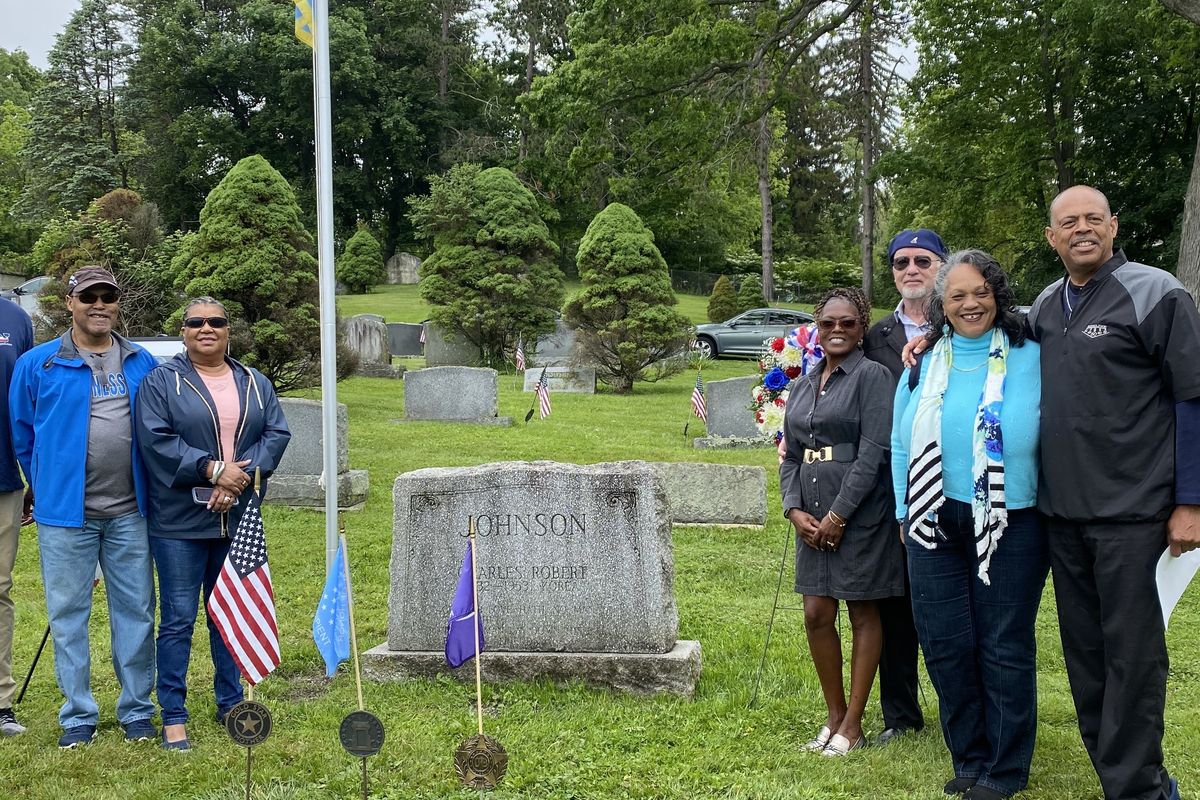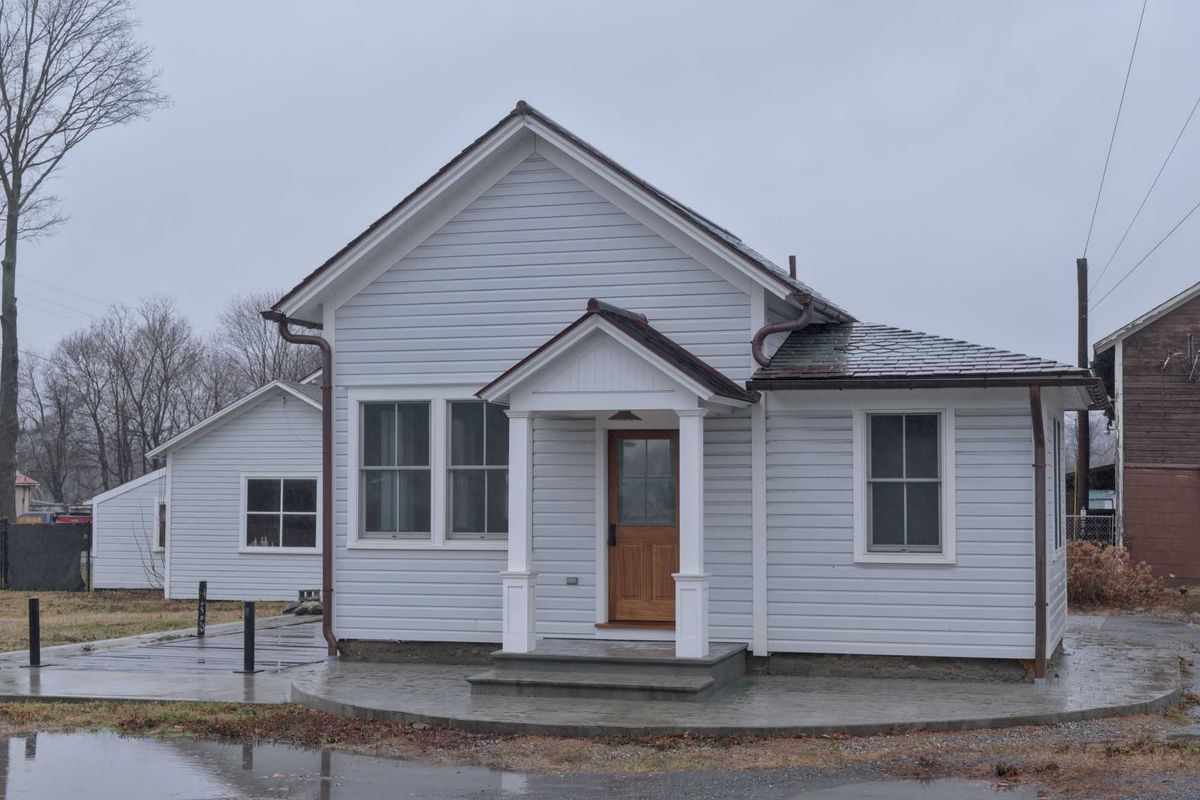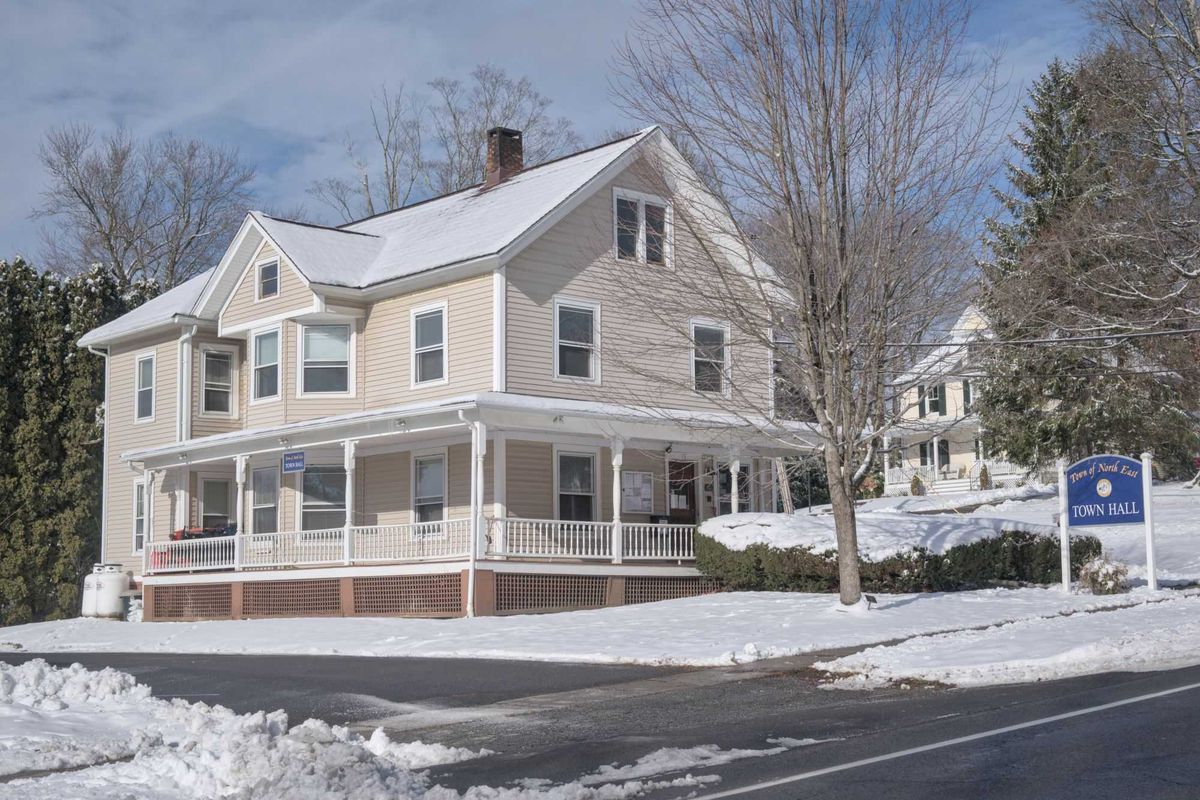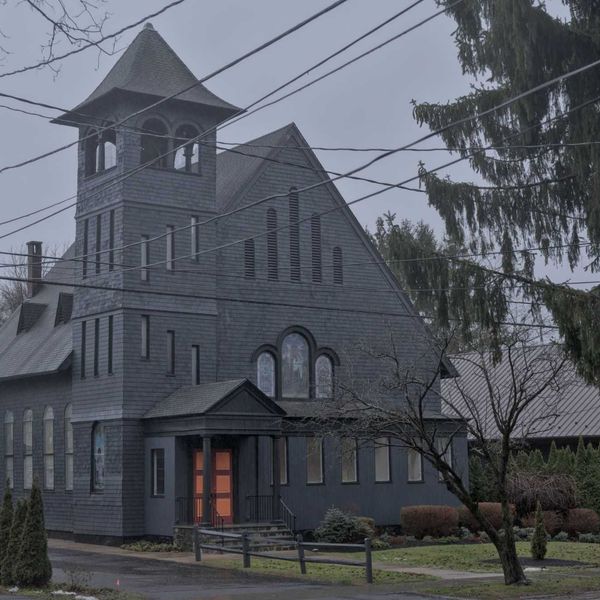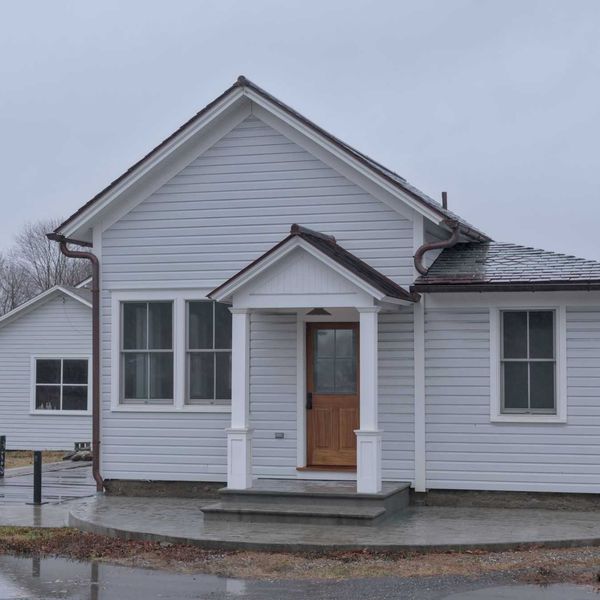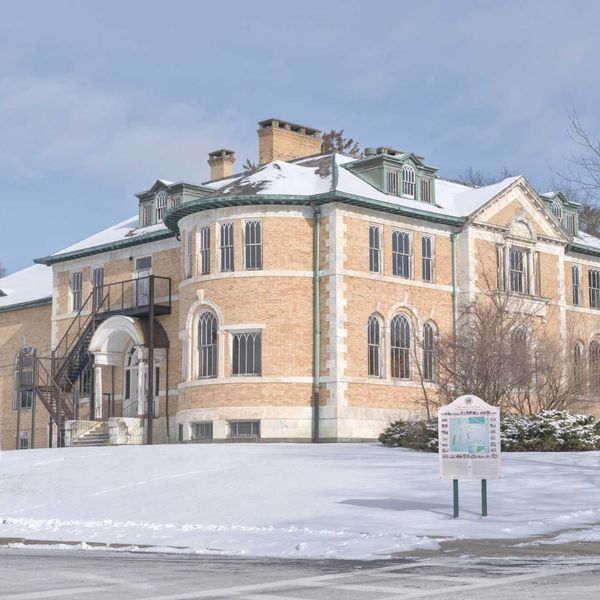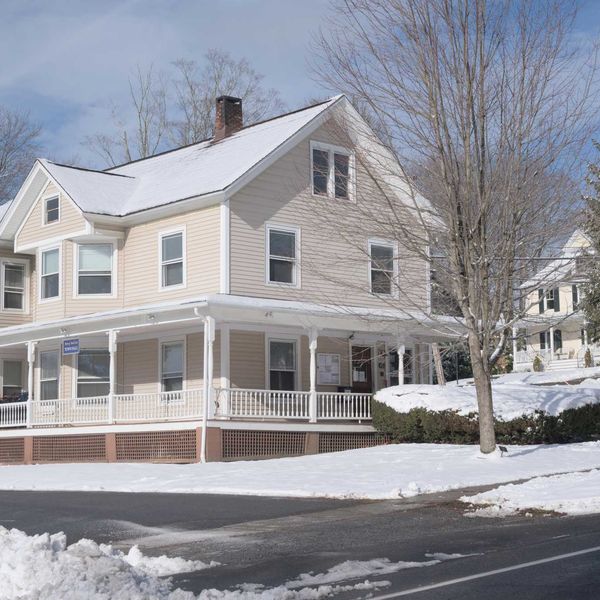Latest News
Road crews began construction in August on a new sidewalk along Route 44 connecting Amenia’s town center to Beekman Park, a project scheduled for completion in spring 2026.
Photo by Leila Hawken
The past year in Amenia was marked by steady progress on infrastructure, preservation and community projects designed to improve daily life and position the town for future growth.
In March, the Town Board selected a contractor to extend the sidewalk along Route 44 between Broadway and Beekman Park, with construction beginning in August. When completed this spring, the project will provide a safer pedestrian connection between the town center and the park.
Work also advanced on plans for a new town garage and salt shed. Town crews completed site preparation throughout the year, handling initial land clearing and grading in advance of construction, which is scheduled to begin this spring.
Community groups played a role in enhancing public spaces as well. In early May, members of the Amenia Garden Club planted a native pollinator garden at the Amenia Free Library. Now established, the garden continues to attract bees, insects and birds native to the region.
New businesses added energy to the town in 2025. Isabela, Amenia’s newest restaurant, opened in late March and quickly built a loyal following, drawing steady local interest. In July, the Silo Bakery also opened in Amenia, offering an array of pastries, breads and pies and becoming another popular destination.
Preservation efforts also moved forward during the year. In late May, donations from the Amenia Historical Society and local residents supported restoration work on the town’s 1937 Sanford fire truck. Once complete, the town’s first fire engine is expected to return to public view, including appearances in local parades.
A long-anticipated preservation milestone was marked on July 3, when the town officially accepted the donation of the historic Wassaic Charcoal Kilns. The ceremony formalized the transfer of the two restored 19th-century stone kilns to the town on the eve of Independence Day celebrations.

Community events drew visitors throughout the year. Despite clouds and intermittent rain, classic cars lined Wassaic’s Main Street in late May for a car show organized by Fenders and Flowers. In mid-October, months of planning culminated in the first annual Amenia Harvest Festival, which brought together vendors, residents and visitors.
Equestrian events also expanded in 2025. The Silo Ridge Masters returned to Keane Stud with an additional weekend of show-jumping competition. Riders were drawn to Amenia again in early October for a three-star competition, followed the next week by a new five-star event under the Highlands Cup banner. The expanded competition included two nights of concerts and a car competition.
Voters weighed in during the November election, continuing the town’s support for Democratic candidates. Rosanna Hamm won the supervisor’s race, defeating Republican Terrence McCauley by a margin of 686 to 402. Democrats also strengthened their presence on the Town Board, with Walter Dietrich winning one of two full-term seats and Vicki Doyle securing the remaining year of an unexpired term. Republican Nicole Ahearn won the second full-term seat.
Amenia voters also narrowly chose to retain the town’s ban on retail cannabis sales, approving the measure by a vote of 560 to 515.
Looking ahead, the coming year is expected to bring the completion of the Route 44 sidewalk project and construction of the new town garage and salt shed, along with continued progress on repairs to the Water District’s facilities, including new well heads and pumping station.
Keep ReadingShow less
Family members of Army PFC Charles R. Johnson attended a May 29 ceremony at Nine Partners Cemetery dedicating a permanent marker recognizing Johnson’s Medal of Honor for valor during the Korean War.
Photo by Leila Hawken
MILLBROOK -- Throughout the year, a supportive Millbrook community turned out for civic participation and celebratory events, reinforcing strong local bonds while finding moments of shared pride and reflection.
Among the most significant was the long-sought recognition of PFC Charles R. Johnson, a Millbrook native who was posthumously awarded the Medal of Honor for extraordinary valor during the Korean War.
The honor was presented by President Joseph Biden at a White House ceremony in early January and carried special meaning in Millbrook. In late May, local and county officials, a military honor guard, and Johnson’s friends and family gathered at Nine Partners Cemetery for a ceremony honoring his bravery and dedicating a permanent plaque and flag markers.

Later in the year, Grace Church was filled to capacity as clergy, parishioners and community members gathered for the dedication of a new stained-glass window on the church’s west façade, marking a rare and historic moment for the congregation.
Voters also approved a Capital Budget proposal in May by a wide margin, authorizing more than $38 million for long-needed repairs and renovations to Millbrook Central School District buildings. The project is now proceeding through the schematic design phase.
At the Millbrook Library, a new native pollinator garden was dedicated in early October on the site of a 1953 memorial garden planted by the Millbrook Garden Club in honor of the Flagler family. The family, which has ties to the area, traces its roots to Henry Flagler, a co-founder of Standard Oil and one of the most influential American industrialists in the 19th Century.
Early October also marked the grand opening of the first phase of Bennett Park, developed on the former Bennett College campus. The event drew residents, donors and planning professionals, with a forest-green ribbon cut beneath a tent on the park’s Great Lawn. The phase created Millbrook’s largest public green space, a major undertaking led by the nonprofit Millbrook Community Partnership.
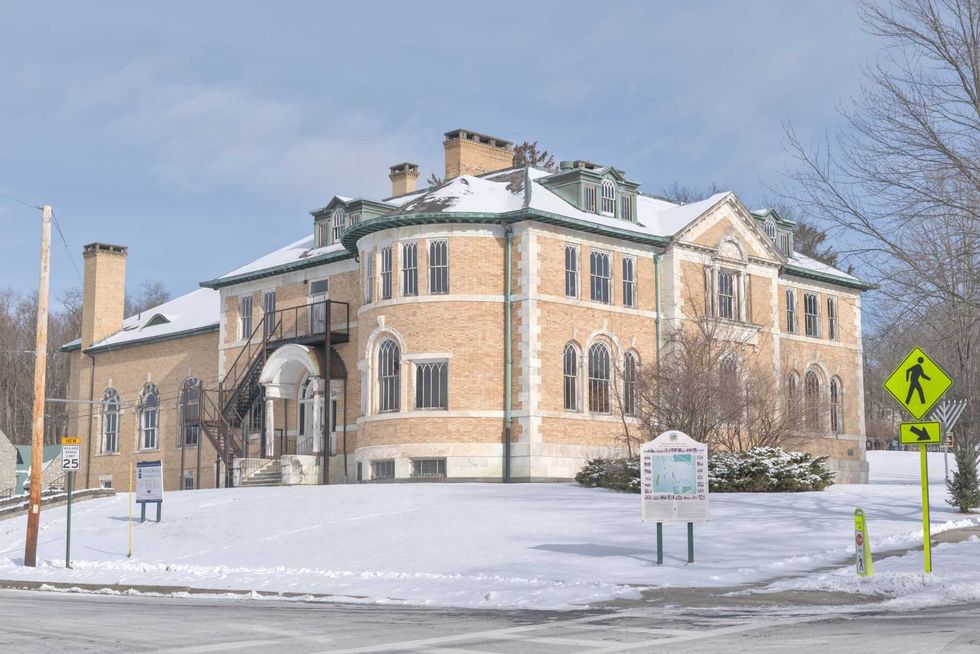
Planning also moved forward on a multi-million-dollar proposal to renovate the historic Thorne Building on Franklin Avenue into a comprehensive arts space, with the Planning Board expected to consider the application in early 2026. The building, which was constructed in the early 20th century and served as a public school, has fallen into disrepair and has largely been vacant for 20 years.
Community spirit was on full display during the long-planned Community Day in September, as residents welcomed visitors from across the region for a day of activities, parades, contests and celebration.
That sense of engagement continued through Millbrook Listens, a year-long effort inviting residents to share their vision for the village’s future, with volunteers gathering input at events throughout the year. Volunteers in colorful T-shirts have appeared at community events ready to listen to any and all ideas.
In the November elections, Washington Democrats won both board seats. Democrats Maxine Verne and Susan Mancuso won the two Town Council seats, defeating Republicans Nicholas Galente and Douglas Giles. Supervisor Gary Ciferri, a Republican, was unopposed.
Keep ReadingShow less
In 2025, the historic weigh station on South Main Street was approved for reuse as Pine Plains’ first retail cannabis dispensary.
By Nathan Miller
PINE PLAINS — In 2025, Pine Plains advanced plans for a new Town Hall and welcomed new business development, even as the community grappled with the loss of its only grocery store.
The Pine Plains Town Board began in earnest this year the planning stages for a new Town Hall building. Officials plan to construct the facility at 8 N. Main St., neighboring the Bank of Millbrook branch at the intersection of Main and Church Street.
Representatives from LaBella Associates, an architectural firm that frequently works with municipalities, presented draft drawings of the proposed Town Hall in October.
Eastern Region Vice President Pasquale Marchese led the presentation, sharing proposed floor plans and a conceptual sketch of the building’s exterior.
Marchese proposed a single-story structure with a basement for additional storage. Under the current concept, each department of town government would have its own office, arranged in a horseshoe-like configuration around a large central room that would serve as both a courtroom and a board meeting space.
The building and zoning departments would be clustered in one corner of the building, with a dedicated entrance designed to shorten the distance the public must walk to conduct business with those offices.
The proposed design encompasses approximately 6,000 square feet, significantly larger than the existing Town Hall, which contains 2,468 square feet of floor area. The current Town Hall, located at 3284 Route 199, was built in 1970 and houses town government offices, including the courthouse and police department.


Town officials also undertook a sidewalk safety audit in 2025, which identified 385 hazards. In September, Town Board members indicated they would work with a grant writer to seek funding for repairs.
Meanwhile, the Pine Plains Planning Board spent much of the year reviewing two major development proposals: a 50,000-square-foot lumber mill proposed by The Hudson Company and the town’s first retail cannabis dispensary.
The Hudson Company has operated for years in a rented Pine Plains location, but representatives said the business had outgrown its current space and sought to build a new facility to accommodate construction operations, a showroom and office space.
After eight months of site plan review and public hearings, the Planning Board approved the mill at its December meeting. The new facility will be located at 2246 Route 83 along South Main Street, south of the Stewart’s Shops gas station.
And Upstate Pines — a dispensary based in Red Hook, New York — also received approval to open a cannabis shop at 7723 S. Main St.
The dispensary will be located at the site of the historic weigh station building, where farmers used to gather to weigh their crops and livestock for sale. The proposal includes tentative plans to adapt other aging buildings on the property for future uses, such as a grocery store or an ice cream parlor.
A grocery store may soon be sorely needed in Pine Plains, as Peck’s Market all but closed over the past year.
Shelves grew increasingly bare, hours became inconsistent and sparse, and the store quietly shuttered in late September, with no public comment from owners Don and Charlene Peck.
Concerns have since emerged about the impact the loss may have on nearby businesses.
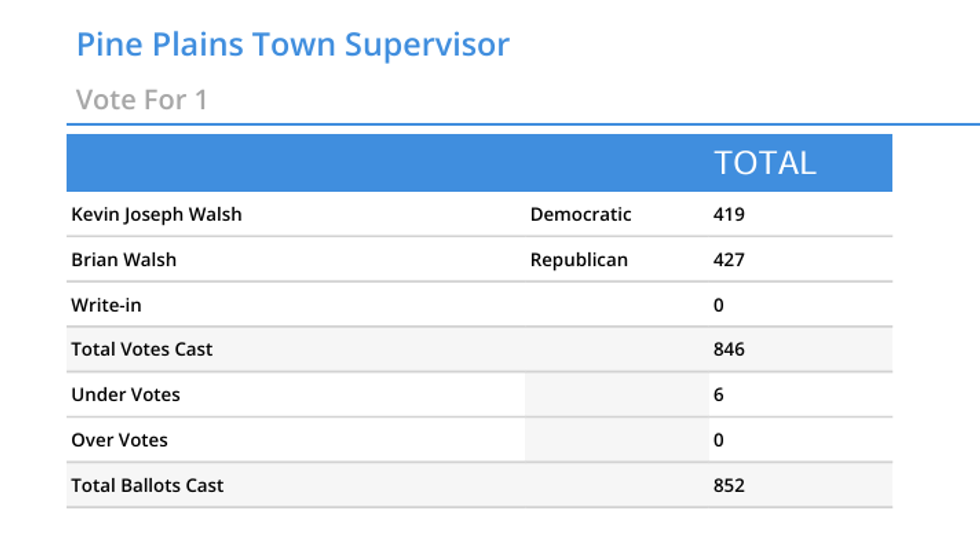
Pine Plains also saw an exceptionally close race for town supervisor. Incumbent Republican Brian Walsh was re-elected after the contest triggered a recount.
The Dutchess County Board of Elections later certified the results, confirming that Walsh defeated Democratic challenger Kevin Walsh by a margin of eight votes.
Keep ReadingShow less
The North East Town Hall building, where town officials will hold a public hearing on Thursday, Jan. 8, at 7 p.m., on proposed zoning code amendments
By Nathan Miller
MILLERTON — The zoning code changes that will be the focus of a public hearing on Thursday, Jan. 8, represent a major overhaul of the code since it was adopted in the 1970s, placing a strong focus on promoting housing options in the town’s commercial district.
The hearing is scheduled for Jan.8 at 7 p.m. at Town Hall and the draft of the amendments can be found online at townofnortheastny.gov/zoning-review-committee/ or in person at Town Hall or at the NorthEast-Millerton Library.
Zoning regulations, which date to the early 20th century, govern how residents and businesses can use their homes and buildings, and their land. Town officials say their goal in modernizing the code aims to support local business and create new housing options.
While there have been some updates over the years to address specific issues, the changes before the public this time are an ambitious attempt to align with the town’s Comprehensive Plan, which was adopted six years ago.
In this first go-round, the focus is on the town’s commercial districts, such as the so-called Boulevard District that runs along Route 44 to the Connecticut border. Residential and land conservation districts have been included to varying degrees in this proposed update, but largely are to be considered in a second phase of zoning review that soon will be initiated.
A housing focus
The 2019 Comprehensive Plan sought “to promote a variety of housing alternatives” and update zoning laws to allow for higher density development in the Town and Village, noting that fewer than one in five housing types were multi-family dwellings and most of them offered fewer than four units.
The predominant single-family housing stock in the Town and Village dated to the mid-twentieth century; 37% of the housing in the Town and 80% of the housing in the Village was built before 1950.“
This is a sea change but it depends on getting sewers in the Boulevard District,” said Edith Greenwood, who headed the six-member volunteer Zoning Review Committee that worked on all the amendments over years. The committee engaged professional consultants with a goal to make the town’s code more accessible, and streamline approval processes, as well as update language and definitions.
The zoning overhaul, however, addresses more than just housing. The revised code is laid out in extensive detail, and its comprehensive approach requires many pages of documentation — 181 pages to be exact. However, many provisions, regulations and procedures remain unchanged even though they are included in the complete document up for review at the Jan. 8 hearing. Here are some of the changes proposed in the new code:
Multifamily dwellings
Existing code doesn’t contain a section about multifamily dwellings, but the amended code applies standards.
“Multifamily dwellings may be located on upper floors of commercial buildings and/or within standalone buildings,” the amendment provides. “No less than three (3) and no more than twelve (12) individual dwelling units shall be contained in a single building,” according to the draft regulation. Floor areas are defined to conform to New York State codes.
Rental apartments above commercial space
This so-called mixed-use development allows for rental apartments above commercial spaces.
“The intent is to permit mixed use development under carefully regulated conditions to facilitate reinvestment in and the renovation of existing commercial buildings, as well as encourage the development of new mixed-use facilities, resulting in positive economic impacts to those properties and the town at large, while imposing minimal burden on town services and municipal infrastructure,” the draft proposal states.
Adding Affordable Housing standards
The current code is amended to include general standards for affordable housing units, including specifics related to the cost and ownership of such units, among others. Such housing provides homes priced below market rate allowing for housing opportunities to low- to moderate-income families with eligibility based on income.
Proposed affordable housing regulations in North East will limit the cost of affordable rental housing to 30% of 60% of the area median income for Dutchess County. The regulations will limit the cost of so-called “ownership” units to 30% of 80% of the county’s area median income.
Affordable housing regulations provide a benefit to developers, allowing additional commercial space on second and third stories in exchange for placing affordable housing units in the remaining floor area above a commercial space. Commercial buildings are allowed to host additional commercial uses on second and third floors as long as it does not exceed 50% of the floor area of those stories. All remaining floor space must be dedicated to affordable housing.
Accessory Apartment section becomes Accessory Dwelling Unit (ADU)
A section of the current code refers to ‘Accessory Apartments’ but that category is amended to regulate ‘Accessory Dwelling Units,’ which is the current terminology. “An ADU shall be clearly incidental and subordinate to the principal one-family dwelling use and shall not change the one-family residential character of the neighborhood,” the amended code reads.
'Everything but the kitchen sink'
The amended zoning regulations also seek to regulate a wide variety of businesses and activities.
Mobile food vendors will need permits to operate. Electric vehicle charging stations, which didn’t exist in the 1970s, will come under the regulations, including charging stations at residences. Outdoor vehicle storage will have requirements spelled out as well as outdoor dining at restaurants.
EV charging stations are allowed at all residences, but regulations require a zoning permit. Residential chargers are allowed inside garages, on an exterior wall or as a freestanding structure adjacent to a driveway. Chargers are also permitted in parking lots for commercial buildings, subject to site plan approval by the North East Planning Board. Parking regulations get extensive coverage in the amended regulations.
They also include amended regulations for roadside farm stands, cell towers and self-storage warehousing, among many others.
The amended regulations call for the creation of a zoning enforcement officer to receive, review applications for a zoning permit, sign permit and certificate of use, among other duties that include inspections to ensure compliance. The town currently contracts a zoning officer, whose services are shared with the Village and with other municipalities.
The amendments update design standards and site-plan expectations for off-street parking, signage, landscaping and exterior lighting, a category that takes up several pages and even includes illustrations. Motel provisions are deleted and replaced with hotel requirements, and include a requirement prohibiting “the establishment of a tenant/landlord relationship or legal residence by any such occupant.”
A section on cannabis regulates the location and operation of retail cannabis dispensaries “to ensure any such use will be in harmony with and will not have a detrimental effect upon the surrounding area and, that both the location and operation are protective of public health and welfare and preserve quality of life.”Cannabis dispensaries will be permitted within the town as long as they are at least 200 feet “from a private or public school, park, playground, library, adult or child day care, or a place of worship.”
Consumption of cannabis on the premises of a dispensary is prohibited, and an onlooker outside the building must be unable to see or smell the products inside. Regulations also require a detailed operational plan as part of the site plan approval process that would contain information about hours of operation, loitering mitigation, lighting and signage among other details of the business.
Public workshops that have been held with the Town Board to review the proposed changes have for the most part been sparsely attended by the public, as they dragged out for hours while board members quizzed the planning experts as well as the town attorney, Warren Replansky, about detail on any number of zoning matters and how North East’s requirements would align with those of New York State and Dutchess County. The amended zoning regulations have been reviewed by the Dutchess County Department of Planning and Development.
Supervisor Chris Kennan said additional public hearings will be scheduled as necessary. In August, Kennan remarked that the adoption of the updated zoning code amendments could stand as the most significant accomplishment of the current board.
Keep ReadingShow less
loading


